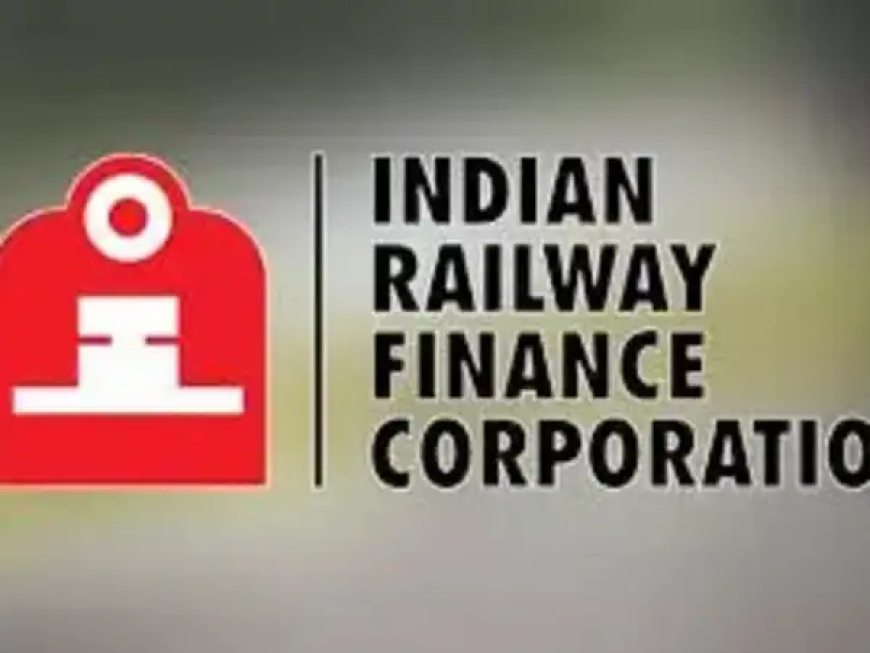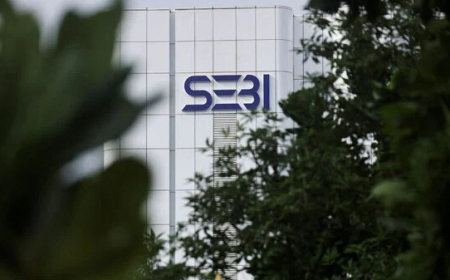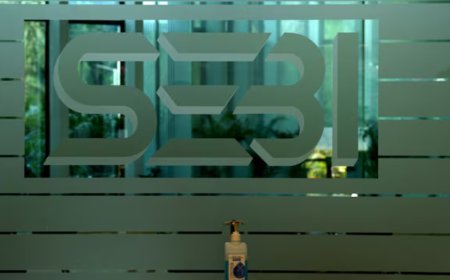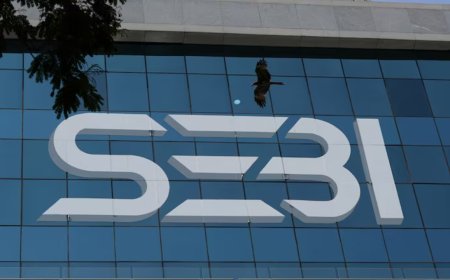IRFC Share Price Surges 6% After Government Approves ₹10,000 Crore Deep-Discount Bond Issue
IRFC shares rise 6% following government approval for a ₹10,000 crore deep-discount bond issue aimed at bolstering Indian Railways' capex. Here’s what it means for investors.

IRFC Shares Rally 6% After Government Nod for ₹10,000 Crore Deep-Discount Bond Issue
Indian Railway Finance Corporation (IRFC), the dedicated market borrowing arm of Indian Railways, saw its shares rally 6% intraday after the government granted approval for a massive ₹10,000 crore deep-discount bond issue. This strategic move, greenlit by the Ministry of Finance, marks a significant financial thrust to support railway infrastructure modernization and long-term capital investment.
The market responded with enthusiasm, recognizing the long-term value creation potential that this funding mechanism could unlock for IRFC and the Indian Railways ecosystem.
Here’s a comprehensive look at what’s driving this optimism and what investors should know going forward.
Stock Performance: A PSU Reawakens
IRFC shares climbed as much as 6% intraday on strong volumes, touching ₹166 before settling slightly lower. The rally follows a period of consolidation, signaling a possible breakout from short-term resistance levels.
The stock has delivered multibagger returns over the past 12 months — rising over 120% on the back of consistent earnings, strong government support, and rising interest in railway-focused PSUs.
Government Nod for ₹10,000 Crore Deep-Discount Bonds: What Does It Mean?
The Ministry of Finance has cleared IRFC’s plan to raise up to ₹10,000 crore through deep-discount bonds — a type of bond sold at a significant discount and redeemed at face value upon maturity, with no periodic interest payout.
This method provides the issuer, IRFC in this case, with:
-
Upfront capital without recurring interest burdens
-
Improved cash flow for long-term railway projects
-
Greater flexibility in aligning debt obligations with project lifecycles
IRFC will issue these instruments with maturities ranging from 10 to 30 years, offering institutional investors a low-risk, long-tenure debt product with government backing.
Why This Move Matters for Indian Railways
This bond issuance aligns perfectly with Indian Railways’ ₹2.4 lakh crore capex plan for FY26, focused on:
-
Electrification of broad-gauge routes
-
High-speed rail corridors
-
Station redevelopment
-
New locomotive and wagon production
-
Track doubling and signal automation
IRFC plays a critical role by financing approximately 45–50% of Indian Railways' yearly capex, and this bond issue will provide fresh capital without straining its balance sheet.
Financial Snapshot of IRFC (Q4 FY25)
| Metric | Q4 FY25 | Q4 FY24 | YoY Change |
|---|---|---|---|
| Net Profit | ₹1,610 crore | ₹1,501 crore | +7.3% |
| Revenue | ₹6,274 crore | ₹5,957 crore | +5.3% |
| EPS | ₹2.42 | ₹2.25 | +7.5% |
| Net Interest Margin (NIM) | 1.42% | 1.35% | ↑ 7 bps |
The results showcase stable and predictable earnings — a hallmark of the IRFC model where lease payments from Indian Railways ensure minimal credit risk and high visibility.
Balance Sheet Strength: Low Risk, High Stability
IRFC operates on a lease-based financing model, where assets funded are leased back to the Indian Railways. The leases are structured such that repayment is virtually guaranteed by the Government of India.
Key balance sheet highlights:
-
Zero non-performing assets (NPAs)
-
AAA credit rating from CRISIL and ICRA
-
Cost of funds below 6%
-
Leverage comfortably within regulatory limits
The approval for deep-discount bonds not only diversifies IRFC’s borrowing instruments but also strengthens its positioning among long-tenure debt issuers.
Dividend & Valuation Overview
For FY25, IRFC declared a dividend of ₹1.45 per share, offering a yield of around 0.9%, which though modest, reflects its policy of distributing consistent payouts while preserving growth capital.
In valuation terms:
-
IRFC trades at a P/E of 12x, still lower than most infrastructure PSUs
-
Its Price-to-Book Ratio stands at around 2.3x, reflecting reasonable asset coverage
-
The stock remains fundamentally sound and under-owned by institutional investors
This leaves significant headroom for re-rating, especially in a railway-focused government policy regime.
Brokerage Views & Market Sentiment
Following the government nod, several brokerage firms expressed bullish sentiment:
-
Nuvama Institutional Equities: “The bond issue enhances financial agility. IRFC’s monopoly position and fixed-margin model offer high predictability.”
-
Axis Securities: “Long-duration instruments match IRFC’s asset profile. Maintain BUY with a revised TP of ₹190.”
-
ICICI Direct: “Expect ROE to stay above 12%. Expansion into new instruments will deepen capital access.”
The consensus is crystal clear — IRFC is no longer a sleepy PSU, but a vibrant infrastructure financing engine.
Technical Analysis: Bullish Continuation Confirmed
On the technical front:
-
RSI surged above 68 — entering bullish territory
-
The stock has broken out from a descending wedge pattern
-
50-DMA at ₹152 now acts as a strong support
-
Next resistance is placed near ₹174, beyond which fresh highs are possible
Short-term traders could eye ₹170–₹175 as a potential breakout target.
IRFC vs Peers: Where It Stands
When compared to other PSU financing companies:
| Company | P/E | ROE | Dividend Yield |
|---|---|---|---|
| IRFC | 12x | 12.5% | 0.9% |
| PFC | 5.8x | 20.2% | 4.1% |
| REC | 5.4x | 19.5% | 4.5% |
| HUDCO | 7.3x | 13.8% | 1.7% |
IRFC trades at a premium because of its government-guaranteed counterparty, zero NPAs, and monopoly status in railway financing.
Key Risks to Watch
While the story looks promising, investors should keep an eye on:
-
Interest rate risks — Though IRFC passes cost changes to Indian Railways, spreads can shrink in high-rate environments.
-
Policy delays — Any bottlenecks in budget execution by Indian Railways could affect disbursements.
-
Limited diversification — IRFC depends solely on Indian Railways; efforts are underway to explore other central entities.
However, these risks are mitigated to a large extent by sovereign guarantees and the long-term nature of IRFC's contracts.
What Should Investors Do Now?
For Long-Term Investors:
-
Continue holding; the ₹10,000 crore bond issue provides strong future capital certainty
-
The fundamentals remain intact and are improving
-
Consider SIP-based accumulation strategy for stability and compounding returns
For Traders:
-
Watch for breakout beyond ₹170 with strong volume confirmation
-
Use ₹152 as a trailing stop-loss
-
Ride the short-term momentum while monitoring bond launch dates and market response
Final Thoughts
IRFC’s rally following the government’s ₹10,000 crore deep-discount bond approval is more than just a market reaction — it’s a vote of confidence in the PSU’s evolving role in financing India’s railway revolution. As capital markets and policymakers align to modernize India’s infrastructure, IRFC finds itself at the epicenter of transformation.
With stable earnings, sovereign backing, and expanding financial innovation, IRFC is not just a “safe bet” — it’s now an essential piece of India’s growth puzzle.
The bond issuance could well be a gateway to the next leg of growth, both in market capitalization and investor perception.
This content is intended for educational and informational purposes only and does not constitute investment advice. Please consult a registered financial advisor before making investment decisions.
What's Your Reaction?
 Like
0
Like
0
 Dislike
0
Dislike
0
 Love
0
Love
0
 Funny
0
Funny
0
 Angry
0
Angry
0
 Sad
0
Sad
0
 Wow
0
Wow
0












































































